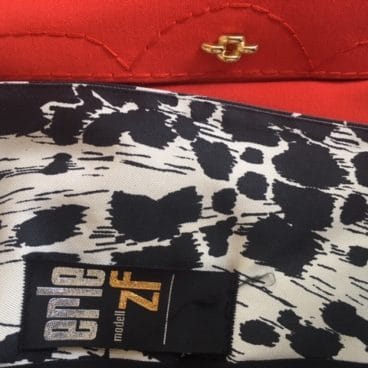
COVID and Change
What's in a label?
In fashion there is transformation, the glamourous spell, the ability to create something magical.
I've written about the power of clothes in my life before. And I'm grateful for the wonderful creatives, designers and skilled makers that have empowered me to be my best self. Oh, the beautiful things I have worn and the wonderful feeling I have enjoyed.
Clothes arrive in our lives a part of a bigger package from an industry that depends on smoke and mirrors to glorify the product. This ability to create make-believe is one of the things that drew me 40 years ago. I like fantasy too. But there are also falsehoods, false steers, and yes lies particularly about the labour behind the label.
As I saw my industry change from specialist maker to industrial producer, engaging in exploitative, wasteful and unkind behaviour, like many, I distanced myself. The career I now have is a result of choices I made in walking away from the system, to get closer to the humans in and around it.
I am a simple soul and have fashioned a manifesto for my own process. Be inclusive and be transparent. Buy less clothes and pay a fair price for products made sustainably. Repair them, swap them, pass them on and then break them back down to remake.
I'm a big second hand buyer too and I get excited by vintage labels. Especially vintage made in Italy labels - or made anywhere in Europe before or during the 80s. These labels speak to me of a time when clothes were not mass produced in giant industrialised cities because I don't want to support an exploitative system that prioritises expansion over human safety.
As Spectator Magazine recounts in a recent feature... “During the past three decades, more and more Chinese investors have bought into textile and leather-good factories in northern Italy, bringing over Chinese labourers to work in those factories. By 2010, there were reportedly 60,000 Chinese in Prato, an industrial suburb of Florence. To accommodate Italy’s new foreign labour force, nonstop flights were established between China and Rome.” This reporter and others - se other links below - tells of workers in crowded, un-safe conditions working long hours for low pay. This is knowledge is at odds with the artisanal Italy I believed in from old.
The rapid outbreak of COVID 19 in Italy, is NOT the fault of a low-wage Chinese labour force, who have built the Italian luxury market and will have suffered from the same pandemic in factory barracks, away from their loved ones But it does beg certain questions during this life-changing time of lockdowns and social distancing.
When I first posted this info on the Gram my feelings were raw. I was disappointed that the Made in Italy label was not made under the conditions I associate with an artisanal workforce...FAR from it. Some were upset by my turn of phrase and so I have toned this more considered post down. Let me re-iterate I stand in solidarity with Italians and Chinese people. COVID has destroyed the lives of many.
If you like me are using this time to reflect on where you would like your creativity to take you, then I'm excited by the outcomes we might achieve together.
What we have learned?
1. That luxury is dependent on perception. For a while back there toilet rolls acquired a far more covetable status globally than any fine fabrics or leather goods.
2. That our perceptions of what matters can turn on a dime.
3. We cannot buy our way out of ill-health or planetary catastrophe.
4. That the more liberated we become from conveyor-belt buying the more reluctant we become to support capitalism.
4. That luxury clothing production, not just fast fashion, has contributed to many ills and inequalities. And, like so much of the outdated fashion protocol in place must be addressed by all of us. (Post COVID I will continue my nothing new for 52)
5. That no matter what the price of the luxury item, this does not guarantee worker safety and well being. See feature below for further research.
Vital Reading: New Yorker - The Chinese Workers Who Assemble Designer Bags in Tuscany




